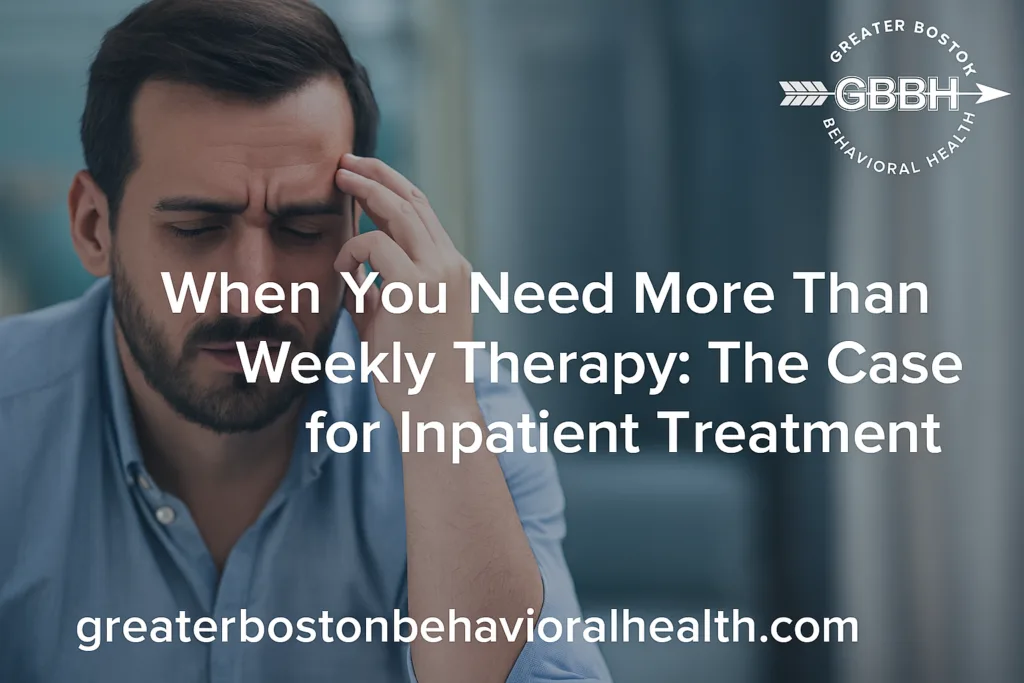Sometimes, healing doesn’t come from just talking about it once a week.
You’ve done the work. You’ve stayed sober. You’ve shown up—for therapy, for your job, for your family. But inside, something feels off. Like your engine is running, but you’re not going anywhere.
That feeling doesn’t mean you’re failing. It means you might need a different kind of support—one that wraps around your whole self. Here’s why an inpatient treatment program in Boston, MA could be the next step when weekly sessions just aren’t cutting it.
1. You’re Holding It Together on the Outside—But Numb on the Inside
You know how to function. You check the boxes. But lately, everything feels dull. There’s no fire. No joy. Just routine. Even the things you used to care about now feel like obligations.
This emotional flatness is common in long-term recovery. It’s the phase where external structure is present, but internal engagement has dulled. And that’s not something to push through. It’s something to address.
Inpatient treatment offers a space that isn’t just safe, but emotionally honest. A place to reconnect with what you’ve buried—without judgment.
2. Therapy Is Helpful, But You Need More Than One Hour a Week
Your therapist gets you. But one hour each week is like trying to move a mountain with a spoon. You start to open up, and before you know it, the session’s over. The progress is real, but it’s slow—and right now, it feels like you’re slipping further behind.
Inpatient treatment surrounds you with care. You’re immersed in a setting where healing isn’t a calendar event—it’s the environment. Every meal, every group, every quiet evening becomes part of the work. Instead of squeezing your growth into a tight schedule, you finally have room to stretch out and feel everything.
3. You’re Tired of Carrying It Alone
Let’s be real: emotional weight is heavy. Even when you’re strong. Even when you’re “doing well.”
If you’re the one others rely on, the one who “has it together,” it can feel almost impossible to admit when you’re not okay. But you deserve support that matches the depth of what you’re carrying.
Inpatient care gives you that. You’re no longer holding it all by yourself. You’re surrounded by people—professionals and peers—who don’t just listen, but really get it.
“I didn’t realize how much I missed being seen—like really seen. Not as someone who’s ‘doing well,’ but as someone who still needed help.”
— Inpatient Client, 2023
4. You Want a Deeper Reset—Not Just More Coping Tools
You’ve got the toolkit: journaling, breathwork, meditation, positive self-talk. They’ve helped. But lately, they feel like band-aids over something deeper.
That’s where inpatient care can be transformational. It doesn’t just hand you new tools—it helps you examine the blueprints. What are the old patterns still running the show? What pain haven’t you let yourself grieve? What do you really need to move forward?
In a 24/7 setting, there’s room to ask these questions—and actually sit with the answers.
5. You Know Something’s Off—Even If You Can’t Name It
Sometimes the hardest part is not being able to explain what’s wrong. You just know: this isn’t working. You’re waking up irritable. Crying over small things. Zoned out in the middle of conversations.
When the symptoms are blurry, it’s easy to minimize them. But they’re signals. And they matter.
Inpatient treatment creates a pause. A clean break from the habits, environments, and expectations that might be clouding your emotional clarity. You don’t need a diagnosis to deserve this kind of care. You just need truth—and time.
6. You’ve Outgrown the Level of Support You’re Getting
Growth doesn’t mean you don’t need help. Sometimes it means you need more help—just in a different form.
If therapy was exactly what you needed six months ago, but now feels like it’s not going deep enough, that’s not a failure. That’s a sign you’re ready for the next layer. An inpatient treatment program isn’t about starting over. It’s about continuing the work—with stronger scaffolding, and with people who can hold space for the complexity you’re living.
Frequently Asked Questions About Inpatient Treatment
What exactly happens in an inpatient treatment program?
You’ll live on-site for the duration of your care, participating in individual therapy, group sessions, holistic practices (like art, movement, or mindfulness), and clinical support. Every part of your day is designed to support healing—emotionally, physically, and mentally.
How long does inpatient treatment usually last?
Most programs last 30 to 90 days, but this depends on your individual needs and goals. We work with you to build a timeline that feels supportive, not rushed.
Is this just for people in crisis?
Not at all. Inpatient care is also for people who are stable but stuck—those who are functioning, but not thriving. If you feel emotionally disconnected, flat, or overwhelmed, this level of care might be exactly what you need.
Will I be cut off from the outside world?
You’ll have time for reflection and disconnection, but most programs allow some communication with loved ones and gradual reintroduction of life outside. The goal isn’t isolation—it’s immersive healing.
Is Greater Boston Behavioral Health a good fit for this?
Yes. We specialize in comprehensive, compassionate inpatient programs tailored for individuals in all stages of recovery and mental wellness. Located in Boston, MA, we’re deeply committed to helping people find clarity, purpose, and peace.
Ready to Feel Like You Again?
If weekly therapy has taken you as far as it can—but your spirit still feels distant—an inpatient treatment program may be the reset you need.
Let’s talk it through. Call Greater Boston Behavioral Health at (888) 301-8072. We’ll walk you through what inpatient care looks like—and whether it’s the right next step for you.
Suggested Links:
- Learn more about our intensive outpatient program in Massachusetts
- Explore what does depression really look like?


